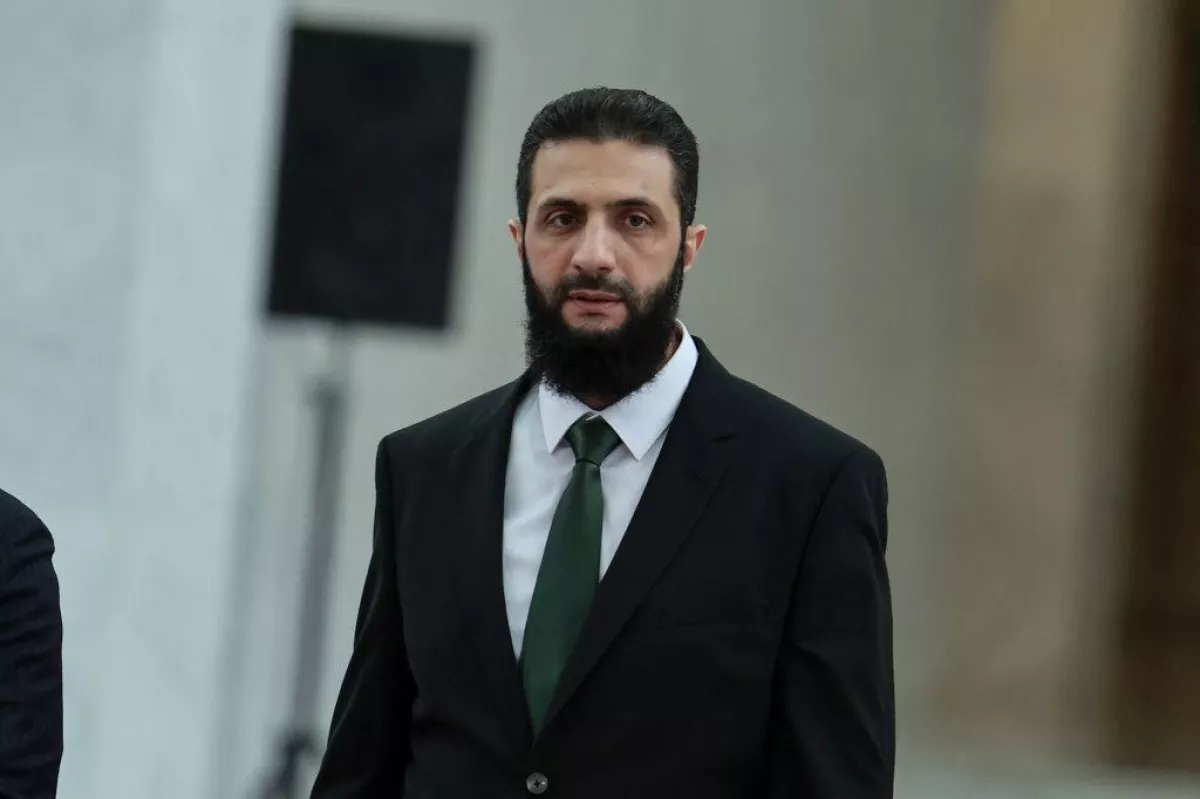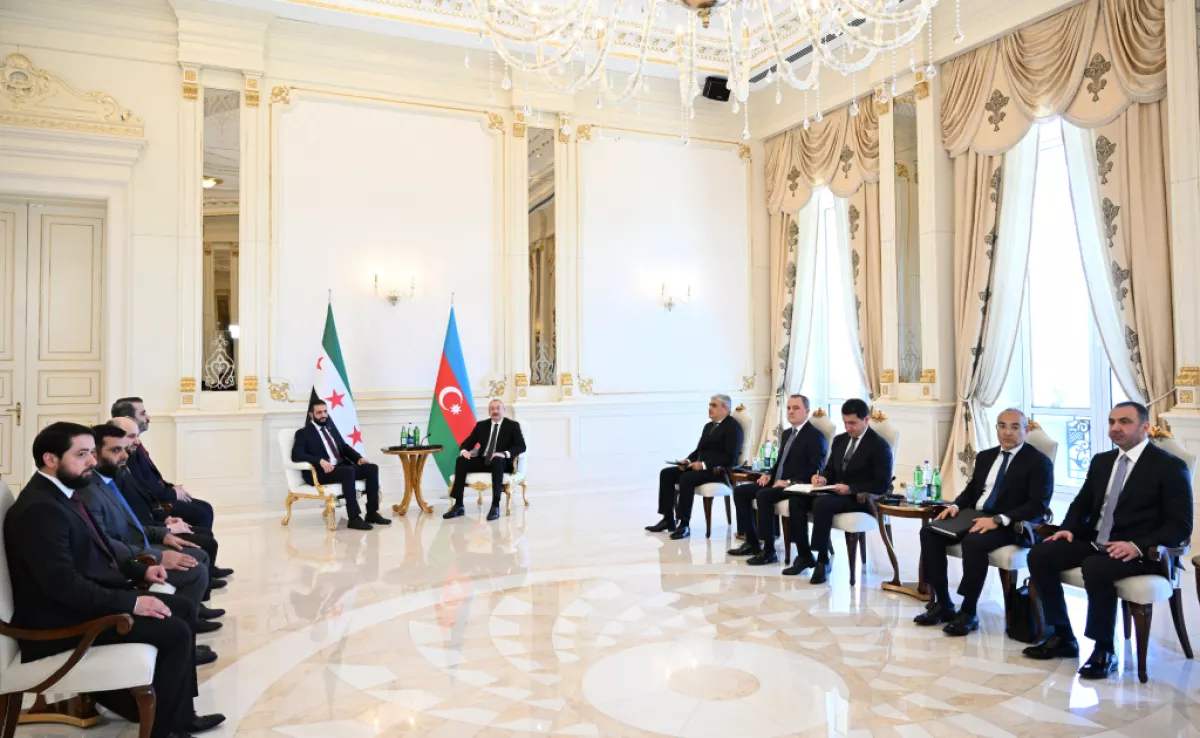Azerbaijan reaches new geopolitical frontiers Following the visit of Ahmed al-Sharaa to Azerbaijan
Precision—this is one of the first words that comes to mind when speaking of Azerbaijan’s foreign policy moves. Over the past 24 hours, this word has once again proven relevant, in light of the official working visit to Baku by the President of the Syrian Arab Republic for the transitional period, Ahmed al-Sharaa. But before delving into the finer points of this development, it is worth briefly outlining the path that led to it—thereby illustrating that very same precision.
In December 2024, an official Azerbaijani delegation led by Deputy Foreign Minister Yalchin Rafiyev visited Damascus. During a meeting with his Syrian counterpart, he expressed Baku’s readiness to support the new Syria both on the diplomatic front and through humanitarian aid. Soon after, a long-standing principle recognised in global political circles was reaffirmed: the official statements of Baku never diverge from action. That same December, a convoy of 10 trucks carrying approximately 200 tonnes of humanitarian aid was dispatched from Azerbaijan to Syria.
In January 2025, Azerbaijani Foreign Minister Jeyhun Bayramov, outlining Baku’s proposals to support Syria in various spheres, particularly emphasised the importance of Damascus’s full reintegration into the international system—and expressed readiness to assist in this process. By February, following a 13-year hiatus, Azerbaijan’s embassy in Damascus resumed its operations. A press release from the Foreign Ministry stated that Baku, guided by the principles of international law, supports the establishment of lasting peace and stability in Syria.
In this context, one cannot overlook the unpublicised visit to Baku in March of this year by Steve Witkoff, Special Envoy of U.S. President Donald Trump—a visit reported by several global media outlets. According to an article in The Jerusalem Post, as cited by Caliber.Az, the visit reaffirmed “experts' assessment that Azerbaijan may play a key role in global diplomacy in the coming period.”
In early April, Ahmed al-Sharaa sent a congratulatory message to President of Azerbaijan Ilham Aliyev on the occasion of the Ramadan holiday, wishing the country continued progress, well-being, and prosperity. That same month, the leaders of the two countries met in person on the sidelines of the Antalya Diplomacy Forum. President Aliyev reaffirmed Baku’s readiness to participate in Syria’s reconstruction process. The head of Syria’s transitional government, expressing gratitude for Azerbaijan’s support, stressed its importance for future cooperation in the fields of energy, infrastructure, and security. It was during this meeting that al-Sharaa gratefully accepted the invitation to visit Azerbaijan.

In April, Azerbaijan also served as a platform for negotiations between delegations from Israel and Türkiye. At that time, relations between the two countries had reached a high level of tension, particularly over issues related to Syria. According to Middle East Eye, one of the key outcomes of the meeting was the establishment of a direct communication channel between Israel and Türkiye for the rapid resolution of potential military incidents in Syria.
In May, the Israeli news outlet Ynet reported that talks had taken place in Baku between Israel and Syria, mediated by Azerbaijan and with the participation of Turkish representatives. This marked the first direct contact between Israel’s security structures and the new Syrian leadership—an event that sparked interest in many world capitals.
Meanwhile, a delegation from Azerbaijan led by Deputy Prime Minister Samir Sharifov visited Syria. During his meeting with al-Sharaa, potential cooperation in various fields was discussed. It was noted that Baku’s experience in the reconstruction of its liberated territories could be valuable for Syria as well.
In June, the finalisation of an agreement originally signed in January was completed between SOCAR and Israel’s Union Energy for the acquisition of a 10% stake in Israel’s Tamar gas field. That same month, while receiving the credentials of the newly appointed Palestinian ambassador, President Aliyev once again reaffirmed Baku’s commitment to the two-state solution and relevant UN resolutions in resolving the Israeli–Palestinian conflict.
The summer brought a continuation of important developments. Azerbaijan’s Foreign Minister reiterated the country’s readiness to participate in Syria’s reconstruction and to continue providing humanitarian assistance. In July, Ahmed al-Sharaa paid a working visit to Baku—a visit that entered the annals of international diplomacy for its far-reaching outcomes.

One of the key results of the visit was the signing of a memorandum of understanding between SOCAR and the Syrian government. The parties agreed on the supply of Azerbaijani natural gas to Syria via transit through Türkiye. During expanded talks, it was noted that the previous Syrian government had pursued an unfriendly policy towards Azerbaijan, which had led to a deterioration in bilateral relations. However, as President Aliyev emphasised, political changes in Damascus had opened up vast opportunities for a new phase of cooperation. Al-Sharaa, for his part, expressed gratitude for the brotherly support and conveyed Syria’s interest in broad-based partnership. Azerbaijan, it was underscored, is well positioned to play a significant role in the restoration of Syria’s energy sector and in the country’s overall post-conflict rehabilitation.
Thus, Azerbaijan is confidently asserting itself as a state expanding its geographic and geopolitical reach, including in the Middle Eastern direction. And this strategic focus goes far beyond the energy sector alone. Considering Syria’s gas potential, the number of countries importing Azerbaijan’s “blue gold” could grow to 13. Moreover, Damascus has the capacity not only to import gas but also to become a vital transit hub—especially in light of reconstruction efforts across the Middle East’s damaged infrastructure, which could open a route for Azerbaijani gas to reach Egypt via Syria.
However, Baku’s significance on the global stage has long surpassed the realm of energy security. Azerbaijan has proven itself to be a key platform for resolving global conflicts—just as it did in 2017 and 2019, when Baku hosted negotiations between the heads of the General Staff of Russia’s Armed Forces and the United Armed Forces of NATO in Europe.
In this context, it is no surprise that media outlets reported a meeting in Baku—mediated by Azerbaijan—with the participation of representatives from Israel and Syria (though not at the head-of-state level, according to preliminary information).
Azerbaijan’s regional leadership is thus successfully expanding into other geopolitical latitudes. At the core of this progress, as President Ilham Aliyev has repeatedly emphasised, lies the unwavering protection of Azerbaijan’s national interests—a principle that is not subject to revision. And once again, we return to the word with which we began: the precision of Azerbaijan’s actions across all fronts.








